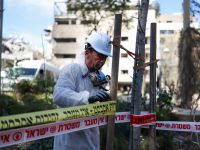An Iranian diplomat kidnapped in Yemen has been freed and returned to Tehran on Thursday, official media reported.
In July 2013, Nour-Ahmed Nikbakht was seized by gunmen suspected of being members of al-Qaeda, while leaving his home in Sanaa.
Iranian state television broadcast images on Thursday of the diplomat arriving at Mehrabad airport in Tehran.
"I was kidnapped by unknown gunmen and terrorists as I left my home to go to work," Nikbakht said.
He said "many efforts were made by soldiers from (Iran's secret services), the intelligence ministry and the foreign ministry" to secure his release.
Nikbakht was held by militants in a remote area between the southern provinces of Shabwa and Baida, tribal and Yemeni security sources said.
In January 2014, another Iranian diplomat, Ali Asghar Assadi, was shot dead in an attack in a neighborhood in Sanaa housing several foreign embassies.
Yemen, a key front line in the US war against al-Qaeda, has fallen into turmoil since a 2012 uprising forced out autocratic president Ali Abdullah Saleh, who had been in power for 33 years.
Following Saleh’s overthrow, the Houthis, al-Qaeda, separatists from the former independent South Yemen, and tribesmen have been fighting each other to gain power and territory in the fragile state.
The Houthis, who have long clashed with central authorities, descended from their power base in northern Yemen to seize Sanaa in September.
After their attempts to expand into southern and central Yemen were checked by fierce resistance from al-Qaeda and tribesmen, the militia moved to take power in the capital, Sanaa.
On January 22, Yemeni President Abed Rabbo Mansour Hadi and his Prime Minister Khaled Bahah tendered their resignation due to the takeover of capital Sanaa.
Following their resignations, Hadi and Bahah had been held under the house arrest and Mohammed Ali al-Houthi — head of the Houthis’ Supreme Revolutionary Council — has been considered as the de facto person in power in the capital, Sanaa.
On February 6, the Houthis issued a "constitutional declaration" dissolving Yemen's parliament and launching a 551-member "transitional council."
on February 24, Hadi retracted his resignation after escaping house arrest in the Houthi militia-controlled capital, and called all measures taken by the Houthis "null and illegitimate."
In a letter, he called on government ministers to “head immediately” to the southern city of Aden to convene and urged lawmakers to cooperate with him to "salvage the salvageable and to normalize the security and economic situation in all provinces."










